
The decline in the value of Iraq’s national currency and the rise in the prices of foodstuffs and imported goods can be traced back to remarkable change in the policy adopted by the US Treasury and the Federal Reserve Bank of New York.
Both bodies have had a policy shift to curb money laundering and the illegal appropriation of dollars by Iraqi commercial banks for the benefit of Iran and other countries subject to sanctions in the Middle East.
The New York Fed began enforcing tighter controls on international dollar transactions by commercial Iraqi banks in November in a move to curtail money laundering and the illegal siphoning of dollars to Iran and other heavily sanctioned Middle East countries, US and Iraqi officials said according to the Wall Street Journal.
Iraqi banks had operated under less stringent rules since shortly after the 2003 US invasion.
It is time for Iraq’s banking system to comply with global money-transfer practices, the officials added.
Since the procedures went into effect, 80% or more of Iraq’s daily dollar wire transfers, which previously totaled over $250 million some days, have been blocked because of insufficient information about the funds’ destinations or other errors, according to US and Iraqi officials and official Iraqi government data.
Under the new procedures, Iraqi banks must submit dollar transfers on a new online platform with the central bank, which are then reviewed by the Fed.
The system is aimed at curtailing use of Iraq’s banking system to smuggle dollars to Tehran, Damascus and money laundering havens across the Middle East, US officials said.
Another US official said the measures would limit “the ability of malign actors to use the Iraqi banking system.”
US officials have pressed Iraq for years to strengthen its banking controls. In 2015, the Federal Reserve and Treasury Department temporarily shut off the flow of billions of dollars to Iraq’s central bank over concerns that the currency was ending up at Iranian banks and possibly being funneled to ISIS militants, officials said at the time.












